Averting the Spectacles 🫣

🌎 The Big Topic: I always vote
A presidential election is approaching, and unlike Britain’s six-week campaigns, American campaigns drag on interminably. While the Democratic National Convention was airing, I sat on my couch and tuned into… Emily in Paris. I haven’t watched either of the party conventions and don’t care because most of it is merely spectacle.
This doesn’t mean I don’t care about elections. In fact, I’ve voted in every election for which I’ve been eligible to vote. I cast my first ballot in a primary election in September 2002, when I was 17-years-old. (Maryland allows 17-year-olds to vote in primaries if they will turn 18 by the general election.) I haven’t stopped the voting habit since. I’ve stood in the rain to vote, soaking my work shoes and pants. I voted absentee from a hostel in Vietnam, which was logistically exasperating. My habit of voting is as instinctual as brushing my teeth or showering: I manage to do it every time without questioning it.
Political speeches, rallies, slogans, memes, and conventions are not meant for me. I’m voting anyway and unless it’s a lesser-known office (e.g. Advisory Neighborhood Commission or State Board of Education), I will learn more from written sources such as news articles, op-eds, campaign websites, and candidate questionnaire responses.
I’m skeptical of hearing just the candidate’s view as that’s merely one side of an argument. One underappreciated part of living in a very large and wealthy country is we have armies of people in academia, thinktanks, the government, and private firms, who ponder esoteric questions, collect data, conduct surveys, and publish their findings, views, and counterpoints in academic journals or in news outlets. Many people dismiss essays and op-eds— and indeed there are plenty of terrible op-eds— but they are a good place to find analysis of news that would not be appropriate in the rest of the publication.
I have plenty of time to think, sometimes on my many long walks and I’ve written before that I have a rich inner life in my head that I only reveal to people I think might be interested. Here are a few topical issues I ponder in my head:
- To what degree would an import tariff (a fancy word for taxes) increase consumer prices? Would some goods increase in price more than others?
- Can the Federal Government constitutionally affect land-use planning decisions, which are traditionally the prerogative of state and local governments? The Supreme Court has stymied Federal attempts to unleash the power of the purse to strong-arm state-level decision-making.
- If everyone in the country unlawfully were swiftly deported, would construction come to a halt and would food production and restaurant service be greatly disrupted? Would construction costs soar from reduced labor? Would we be able to buy lettuce and tomatoes? I was standing in the produce section at the grocery store wondering what would vanish without undocumented labor; it was a bleak exercise.
- What exactly is “price gouging” and, in the popular imagination, when is it just people griping about prices without understanding the volatility in the cost and availability of inputs? Is it still “gouging” if a firm raised prices but its profits put it in the middle of the pack of profitability for all S&P 500 companies? Is that an undue windfall or just catching up to normal? (Zephyr Teachout published a decent counterpoint to my skepticism.)
I spend a lot of time reading and thinking about these issues. Unfortunately, these important policy issues are too complex to be covered adequately and honestly in the structure of a political campaign. In fact, some of you haven’t reached this sentence because you already fell asleep.
Internet memes about brats and coconuts are amusing and a certain furniture joke is worth a smirk, even though it’s disinformation. Campaign events with celebrity singers and applause-seeking one-liners make the news. None of these things fundamentally change if I will vote and how I vote. In late October (I don’t wait until the last minute!), I will walk my completed mail-in ballot to the Shaw Library and once again, despite having endured a never-ending and exhausting election campaign, cast my ballot into the ballot box, unburdened by what has been.
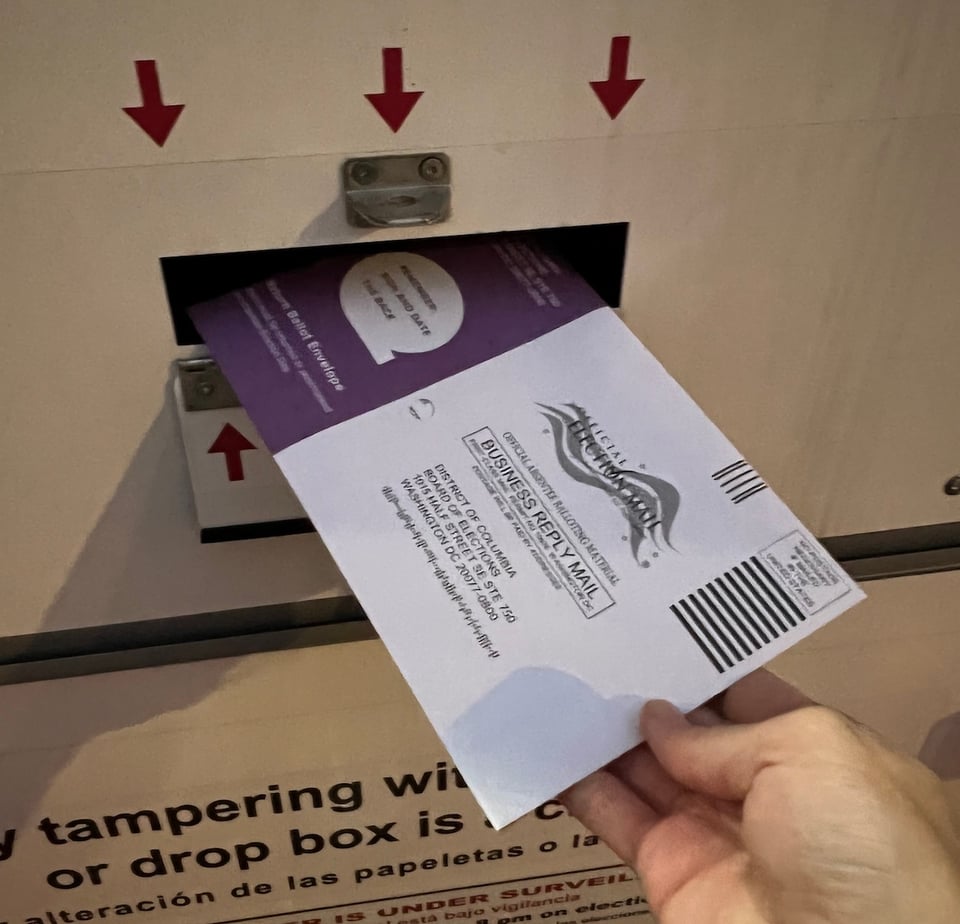
📺 The Screen

Scoop (Netflix)
Earlier this year Netflix released Scoop, a retelling of a BBC news team securing the infamous and disastrous 2019 interview with Britain’s Prince Andrew.
The story is simple: the news team secures the interview and then records it. The real drama is the yawning asymmetry between what the prince and everyone else considers unconscionable behavior.
Anyone who has worked in public affairs will easily spot the prince’s staggering blunders as he attempts to quell a crisis of his own making.

Industry (Max)
The drama about the young and unscrupulous returns for a new season of financial scheming, sleep deprivation, and powder snorting.
I occasionally confused the title Industry with Succession, another Max show about corporate deceit and avarice. The main difference is that Succession focuses on tedious familial infighting over who gets to run a media company and Industry focuses on professional infighting over doing and reaping the rewards of actual work.
Also, the synthy soundtrack by composer Nathan Micay is really good.
👇 FUTURE SHOCK 👇
Queer (U.S. debut forthcoming)
It’s been a busy year for Italian director Luca Guadagnino, who recently released the very bisexual Challengers, a movie I mentioned previously. The director, who earlier directed Call Me by Your Name (2017), released his new movie Queer, starring Daniel Craig (a.k.a. 007), to a lot of buzz (and discomfort) at the Venice Film Festival. I eagerly await its American debut.
🔊 The Speaker

I’ve been listening to the One Song podcast, where DJs Diallo Riddle and LUXXURY record each episode to deconstruct the history and creation of one song. Last week I listed to their deconstructions of…
Head over Heals. Tears for Fears, 1985.
I’ve listened to this song many times for more than two decades and only now discovered the line “Nothing ever changes when you’re acting your age,” layered under other lyrics after Diallo and LUXXURY isolated it. Watch/listen
Toxic. Britney Spears, 2004.
Did you know the opening sounds are sampled from a 1981 Bollywood movie and that two backup singers are layered under Britney’s voice? Listen
🕺 Wandering in Washington
I frequent encounter some hairy traffic on my commute between my office and the Metro station. It’s a highlight of the day.


I went to a friend’s house and we made spam musubi, which is popular in Hawaiʻi.
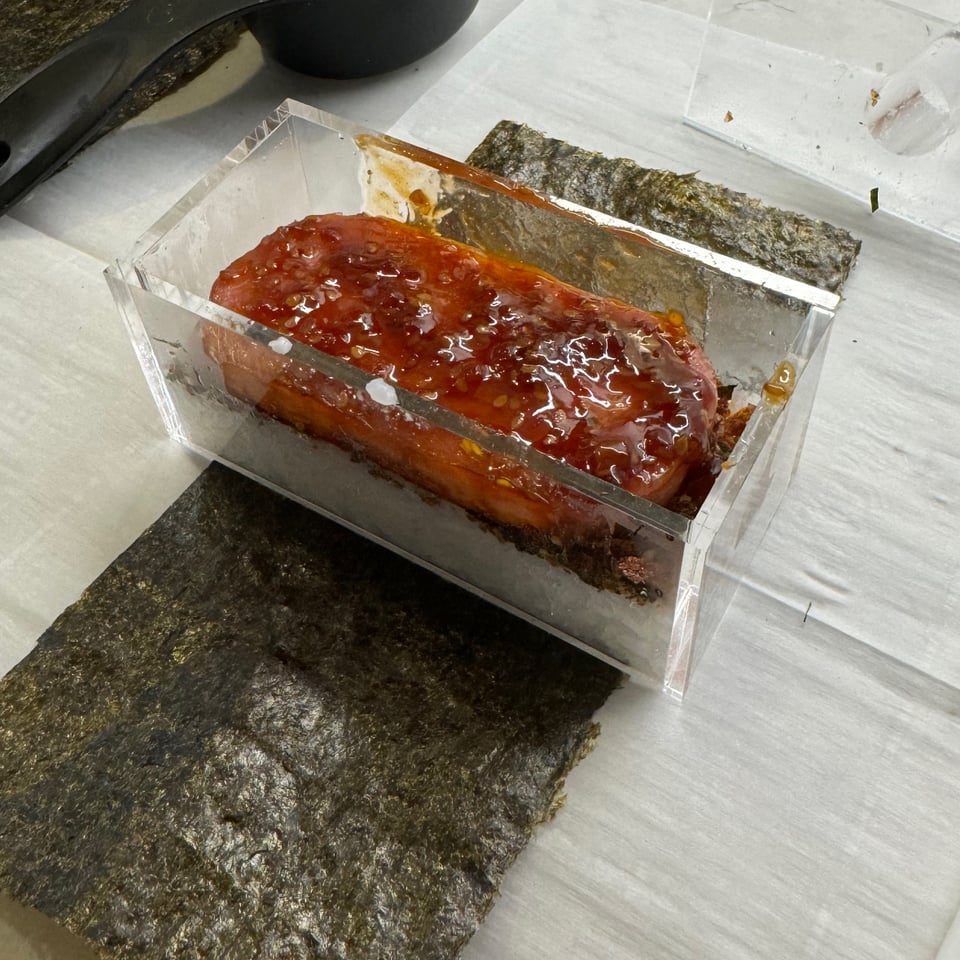
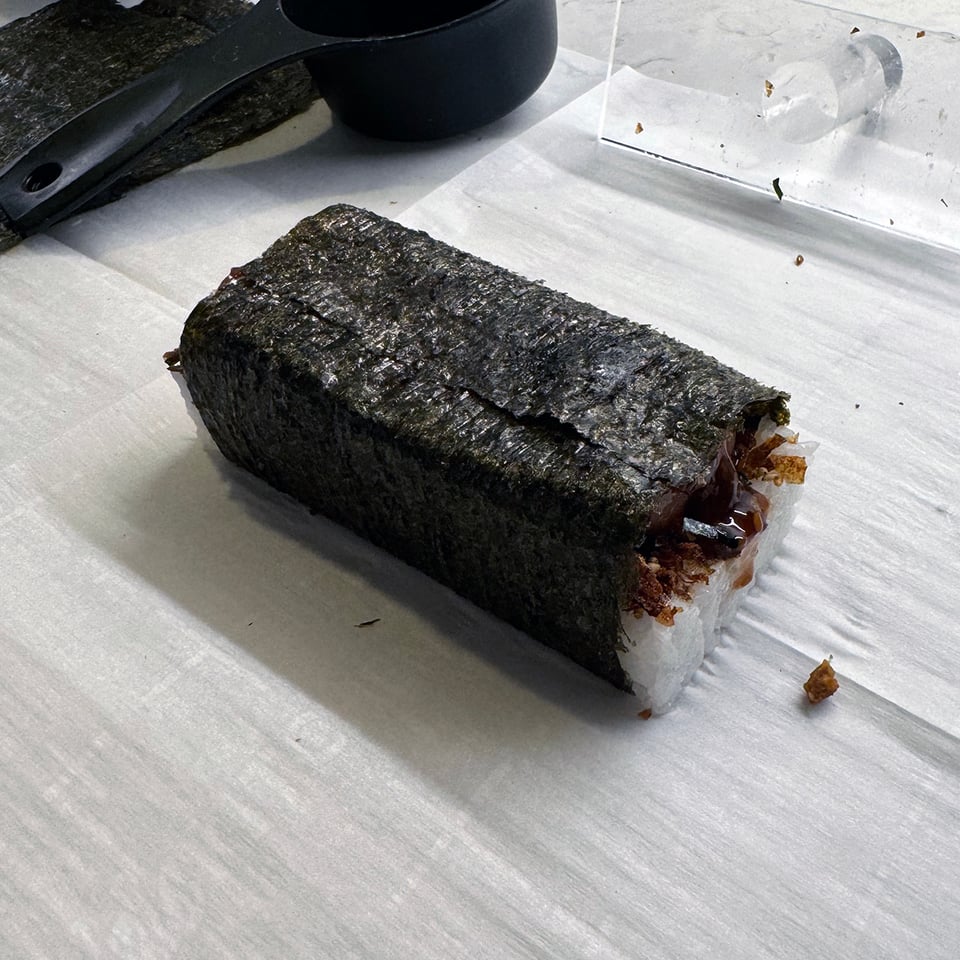
Now for some assorted architecture, from contemporary to Victorian.


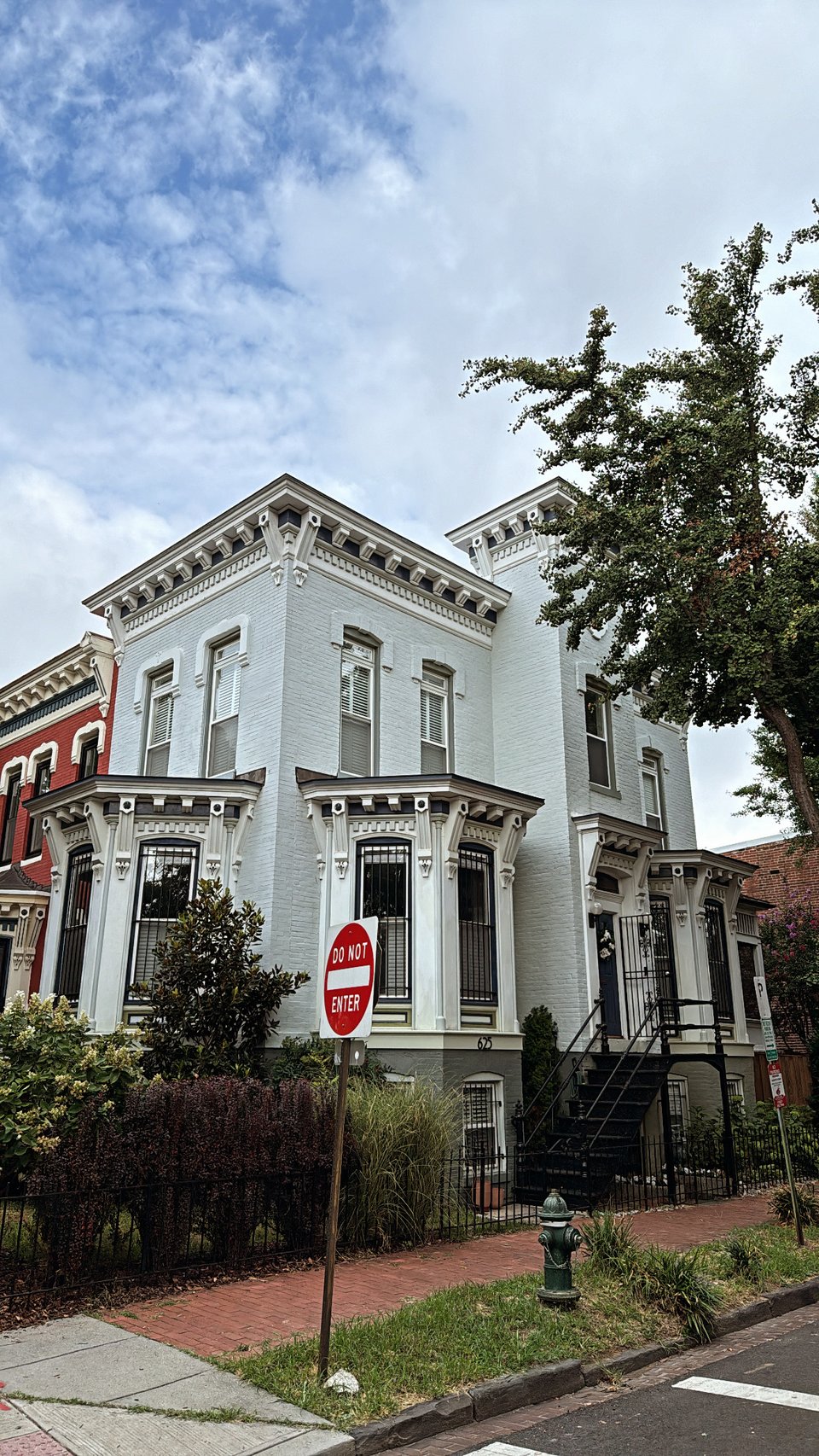


Now a transition to transportation. First is a kei truck, a mini truck imported from Japan. These trucks are affordable and have developed a cult following.
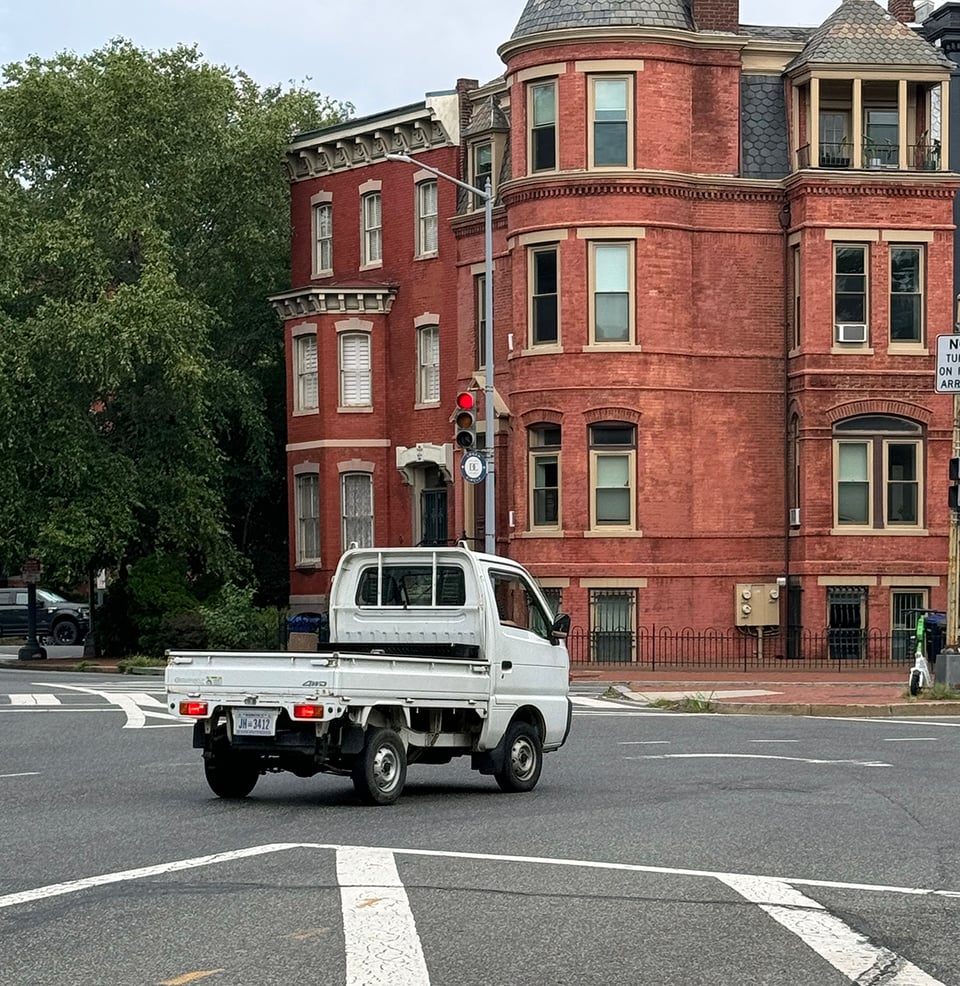
I took my nieces to the National Capital Trolley Museum in Colesville, Md.


🔗 Assorted Links
- 📝 Why DC Is Buying the National Theatre? Could a new downtown theater district be in the works? (Washingtonian)
- 📝 Could Barcelona’s pedestrian-first “superblocks” come to American cities? The author has some ideas for D.C. (Washington Post)
- 📝 The FBI arrested a D.C. Councilmember for allegedly accepting $156,000 in bribes: He was caught on camera accepting envelopes of cash. (Washington City Papers) White became internationally infamous in 2018 for blaming Jews for snow flurries. (Washington Post).
- 📝 Forced to close in China, a beloved bookstore finds a new home — in D.C.: Jifeng Bookstore’s journey from Shanghai to Dupont Circle spanned six years and seven thousand miles. (Washington Post)
- 📝 Mainers will vote on a new state flag. The proposed design, a pine tree and a star, harkens back to the state’s 1901-1909 flag. (Maine Public)
- 📝 Gay Men Have Long Been Obsessed With Their Muscles. Now Everyone Is: In Hollywood, on Instagram and beyond, the male-on-male gaze still decides what’s hot and what’s not. (New York Times)
- 📝 How the Gay-Rights Movement Lost Its Way: What should activist groups such as GLAAD do after they fulfill their goals? (The Atlantic)
- 📝 There Is No Line for Many Immigrants Who Want to Come Here Legally. The U.S. admits a tiny fraction of people who want to immigrate. (New York Times)
- 📝 A controversial innovation comes to Carmel, Calif.: street addresses. Getting deliveries, bank accounts, and driver’s licenses is a pain for town residents, but those days are numbered. (Washington Post)
- 📝 Sometimes You Just Have to Ignore the Economists.
Kamala Harris’s populist “price-gouging” ban irritates academics and is more toothless than the public thinks. (The Atlantic) - 📝 Can Barcelona Survive Mass Tourism? Explore how places and life in Barcelona have changed due to mass tourism. Not every Barcelonan decries the tourist economy. (New York Times)
- 📝 Spanish singles found a new dating strategy. It’s in the fruit aisle. Put a pineapple in your grocery cart if you’re looking for romance. People say it’s a reaction against dating apps. (Washington Post)
- 📝 Too Much of a Good Thing: Americans love big cars, but new analysis suggests that the heaviest vehicles kill more than they save. (The Economist)
- 📝 The Wrath at Khan: Silicon Valley billionaires claim that antitrust enforcement hurts the little guy. Do they have a point? (The Atlantic)
📊 The Numbers
Share of American households with credit card debt.
- 📝 Source: Which U.S. Households Have Credit Card Debt? Federal Reserve Bank of St. Louis.
📨 Letters to the Editor
A reader responds to my photos of my trip through Bilbao, Spain. He was reminded of a trip we took to Pennsylvania to see Centralia and Breezewood. Centralia is a nearly abandoned town that sits atop a coal seam that’s been smoldering since 1962. Near Breezewood are abandoned highway tunnels from the Pennsylvania Turnpike.
While wandering around near Bilbao on Google Maps and Wikipedia (maybe my favorite form of tourism), I came across a nuclear power plant on the coast that was almost completed but never activated. It was the site and source of bloody conflicts with the ETA. It reminded me of our visit to Centralia and Breezewood, Penn., except instead of thinking of what was, as we did in Pennsylvania, the nuclear plant conjures thoughts of what could have been but never was. —Stephen Miller, Montréal
Another reader who migrated away from Twitter is still nostalgic for what it once was:
I've essentially been off the platform for a long time (I don't recall the moment I stopped), but I have always appreciated the way it truly was 'the friends we made along the way.' I was able to visit with Stephen as well when traveling (in Montreal) and I know that wouldn't have happened without the golden days of the platform.
…
I miss being on what felt like a huge chatroom full of cool people and friends. I know that's never coming back, but I am glad to be able to live off the connections made then. — Geoff, Washington, D.C.
🎬 The Wrap
In last year’s Barbie movie, the character Gloria, played by America Ferrera, gives a moving monologue about the contradictory demands society puts on women: “I’m just so tired of watching myself and every single other woman tie herself in knots so that people will like us.”
Gloria’s exasperated observation came to mind when I read journalist Mark Harris’s recent essay on the tortured evolution of the image of the ideal gay body:
In 2024, gay men’s body issues seem to be in a contradictory tussle that will be instantly familiar to anyone who’s ever read a women’s magazine. Today, we’re all told that we should love our bodies exactly as they are — which is clearly not as chiseled or as fit as they could be. We are just right and pathetically short of the mark. We should be stronger, be thinner, care less, try harder, be more defined, be more comfortable with aging, be younger, put more effort into looking more effortless and embrace the limitations that everything from advertising to fashion to movies to … to, yes, a long-overdue trip to the gym will regularly remind us are, in fact, limitations.
~ ~ ~
On many Veterans Days past, I have walked Arlington Cemetery on my own to visit Section 60, an area of the cemetery that was in the news recently. I never forget that on many of the gravestones, the birthdates occurred after my own. I tread carefully through that section, noticing the fresh flowers and photo mementos left at some graves and stones placed atop others. You won’t find tourists in this section of Arlington, but you will see many visitors with somber and mournful faces.
Retired Adm. Mike Mullen described it more poignantly in the Washington Post:
Walk those neat, clean white rows for yourself. Read the headstones. And marvel at the youth beneath your feet. There are few old men or old women buried in Section 60. And there aren’t many old mourners, either. On any given day, you’ll see school-age kids missing a mom or dad, young spouses yearning for the soft embrace of a husband or wife, and parents far too young to have buried a son or a daughter.
Photography is allowed in Arlington Cemetery, unless it intrudes on mourners’ privacy or if it’s for commercial endorsements or for political or fundraising purposes. The four photos that I have posted of the same gravestone are my only four Instagram posts lacking captions. Section 60, where the wounds of loss are still visibly fresh, has never needed my political commentary.